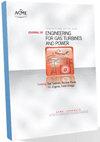燃烧特性预测的人工智能模型的开发,重点是自动点火延迟
IF 2.1
4区 工程技术
Q3 ENGINEERING, MECHANICAL
Journal of Engineering for Gas Turbines and Power-transactions of The Asme
Pub Date : 2023-10-17
DOI:10.1115/1.4063774
引用次数: 0
摘要
氢兼容燃气轮机是脱碳发电的一种方式。由于氢气有爆炸的倾向,燃烧和处理氢气不是一件小事。通过预测详细的动力学模型,可以估计出强制安全参数,但由于计算时间长,限制了与流体力学代码的耦合。开发了一种基于人工智能模型的自动点火预测工具,实现了快速计算和爆炸模型的实现。使用最近从文献中选择的详细动力学模型自动生成点火延迟时间数据集。生成的数据涵盖了广泛的操作范围和不同的燃料成分。采用拟随机Sobol序列,均匀覆盖整个输入参数空间,避免了样本点的聚类问题。不同的算法进行了训练、交叉验证和测试,使用了一个数据库,该数据库包含超过70,000个天然气/氢气混合物的点火案例,该数据库使用完整的动力学模型计算,使用70/30的常见分割进行训练和测试。人工智能模型具有高度的鲁棒性。训练数据集和测试数据集的相关系数平均值均在99.91%以上,平均绝对误差(MAE)在0.03左右,均方误差(MSE)在0.04以下。测试表明,人工智能模型在数据集的压力、温度和等效比范围之外具有鲁棒性。然而,随着天然气中大型烷烃含量的增加,会出现变质现象。本文章由计算机程序翻译,如有差异,请以英文原文为准。
Development of an Artificial Intelligence Model to Predict Combustion Properties, with a Focus On Auto-ignition Delay
Abstract Hydrogen-compatible gas turbines are one way to decarbonize electricity production. Burning and handling hydrogen is not trivial because of its tendency to detonate. Mandatory safety parameters can be estimated thanks to predictive detailed kinetic models, but with significant calculation times that limit coupling with fluid mechanic codes. An auto-ignition prediction tool was developed based on an artificial intelligence (AI) model for fast computations and an implementation into an explosion model. A dataset of ignition delay times was generated automatically using a recent detailed kinetic modelselected from the literature. Generated data covers a wide operating range and different compositions of fuels. Clustering problems in sample points were avoided by a quasi-random Sobol sequence, which covers uniformly the entire input parameter space. The different algorithms were trained, cross-validated and tested using a database of more than 70'000 ignitions cases of Natural Gas/Hydrogen blends calculated with the full kinetic model by using a common split of 70/30 for training, testing. The AI model shows a high degree of robustness. For both the training and testing datasets, the average value of the correlation coefficient was above 99.91%, the Mean Absolute Error (MAE) and the Mean Square Error (MSE) around 0.03 and lower than 0.04 respectively. Tests showed the robustness of the AI model outside the ranges of pressure, temperature, and equivalence ratio of the data set. A deterioration is however observed with increasing amounts of large alkanes in the natural gas.
求助全文
通过发布文献求助,成功后即可免费获取论文全文。
去求助
来源期刊
CiteScore
3.80
自引率
20.00%
发文量
292
审稿时长
2.0 months
期刊介绍:
The ASME Journal of Engineering for Gas Turbines and Power publishes archival-quality papers in the areas of gas and steam turbine technology, nuclear engineering, internal combustion engines, and fossil power generation. It covers a broad spectrum of practical topics of interest to industry. Subject areas covered include: thermodynamics; fluid mechanics; heat transfer; and modeling; propulsion and power generation components and systems; combustion, fuels, and emissions; nuclear reactor systems and components; thermal hydraulics; heat exchangers; nuclear fuel technology and waste management; I. C. engines for marine, rail, and power generation; steam and hydro power generation; advanced cycles for fossil energy generation; pollution control and environmental effects.

 求助内容:
求助内容: 应助结果提醒方式:
应助结果提醒方式:


